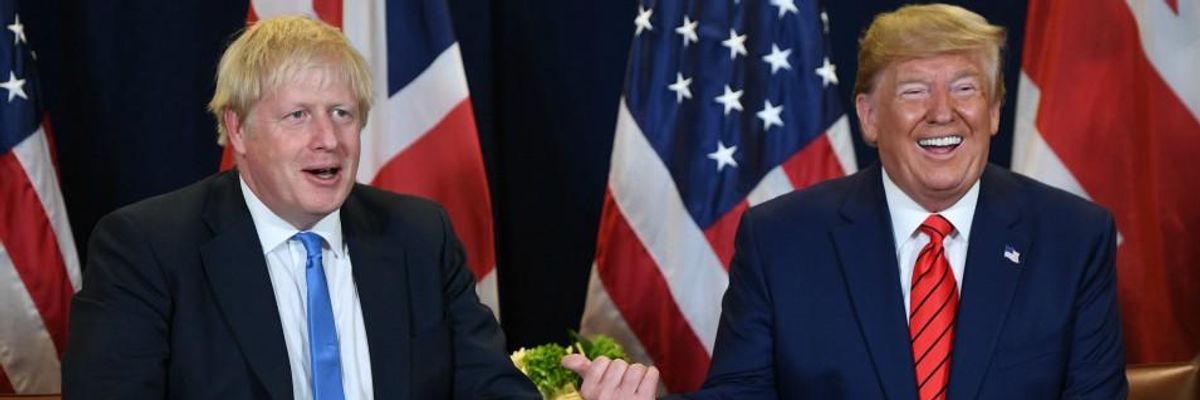The cat is out of the bag: Boris Johnson is dancing to Donald Trump's tune, regardless of the damage this might cause to Britain. His promises to maintain Britain's 'high standards' after Brexit are not worth the paper they're written on.
That's the only conclusion that can be drawn from a set of leaked papers detailing trade talks between US and UK officials over the last 3 years. The minutes, redacted versions of which Jeremy Corbyn held up at last Tuesday's leaders debate, were posted by an anonymous source on the discussion website, Reddit. They show how the US administration has already successfully bullied Britain into taking a harder Brexit position, which is good for Trump's geopolitical games and US big business, but bad for Britain's economy and British welfare.
The papers show US officials pushing Britain to an ever harder Brexit position, clear that they don't want Britain to be a 'satellite of the EU' in the way Switzerland is. They even threaten that if the UK continued to push certain EU positions in international forums--something the UK is still bound to do--it could undermine negotiations on a US trade deal.
Papers from the time of Theresa May's 'Chequers plan' are illuminating because the administration is clearly furious at May's promise of long-term alignment with EU standards which would prevent the dilution of British food regulations which US agribusiness hopes to benefit from. US negotiators saw this as a "worst case scenario" and threatened to raise it with Trump ahead of his UK visit.
One of the most significant changes which Johnson made to May's Brexit deal was a weakening of the alignment to EU standards, suggesting US bullying worked. But it's particularly worrying that economic modelling seen by the trade officials showed this was likely to be good for the US, but much less so for "UK welfare and GDP gains."
We already suspected that the US was pushing lower food standards in Britain post-Brexit. That's because US food standards are far more favourable to big business than EU standards, and the only way to help US business increase its penetration into British markers is to undermine current regulation.
We already suspected that the US was pushing lower food standards in Britain post-Brexit. That's because US food standards are far more favourable to big business than EU standards, and the only way to help US business increase its penetration into British markers is to undermine current regulation. US officials explicitly mention the infamous chlorine-washed chickens, promising to help the British government sell the concept to a sceptical British public. They attack attempts to reduce sugar in food, the protection of regional products (like Stilton cheese and Cornish pasties) and even nutritional labelling, which they say is more harmful than it is useful.
While US officials are eager to give US experts and multinational corporations better "participation" in standard-setting in Britain post Brexit, they are deeply critical of Parliament sticking its nose into such issues. They call the European Parliament's decision to temporarily ban the Monsanto-owned chemical glyphosate "unhelpful".
Although the trade deal could exacerbate the drivers of climate change, US officials report they're "banned" from mentioning greenhouse gas emissions reductions. In fact, the US seems interested in introducing a 'corporate court system' in a US-UK deal, formally known as 'investor state dispute settlement' or ISDS, a mechanism regularly used in other trade deals to make government action on climate change more difficult. ISDS would allow thousands of US multinationals access to secretive tribunals, for the first time, where they can sue the British government for treating them 'unfairly'. Unfairness, in this context, could mean phasing out coal-fired power or banning fracking.
The papers show both sides are deeply interested in a so-called e-commerce chapter, which is aimed at creating new rules for the digital economy. The problem is that these rules would lock in the power of internet giants like Facebook, Google and Amazon, making it harder for governments to tax and regulate these corporations, and making Labour's proposals for a public broadband service all but impossible.
Across all service sectors, the US wants sweeping liberalisation, based on a so-called 'negative list'--unless you specifically list it, assume it will be opened up to US corporate penetration. This could mean parts of the NHS being further opened up (the US expresses an interest in nursing) and would make bringing formerly public services like mail or rail companies back into public ownership that much harder.
Moreover, US officials repeat Trump's concerns that countries like Britain aren't paying enough for our medicines, with a special concern about cutting edge biological medicines used in the treatment of many cancers. Introducing a US-style pricing regime would make such drugs unaffordable to the NHS. Incredibly, trade negotiators received special lobbying from pharmaceutical corporations as part of the trade talks.
Both the British and American sides agree that these talks should be secret--exempt from freedom of information rules--and it's clear to see why. The papers reveal the British government being subject to bullying by the biggest country on earth. Far from taking back control, Britain has clearly entered into a relationship where we hold none of the cards.
They make a mockery of Boris Johnson's manifesto pledge to protect British public services and standards--that would be absolutely impossible under the type of trade deal being discussed here. And they justify Labour's focus on the US trade deal at this election. This deal is at the centre of the divergent views the two biggest parties have about what sort of country they want to build after 12 December. On the one side, we could have a government which tries to fight inequality and climate change by constraining corporate power through tax, regulation and decent public services. On the other, one that will ignore the interests of their own electorate to kowtow to the biggest corporations in the world.




